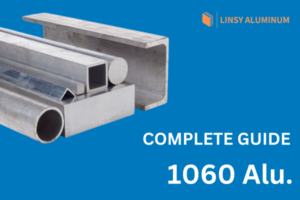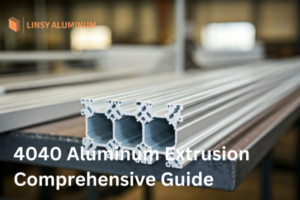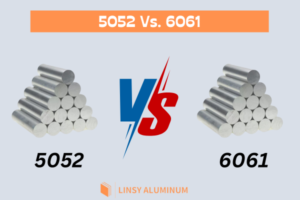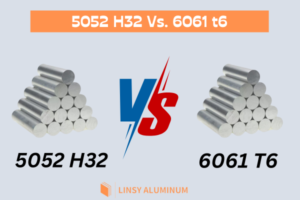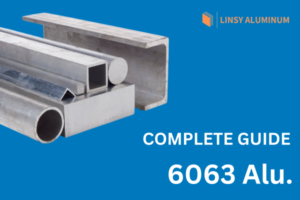Key Highlights
- Marine-grade aluminum plates, like 5052 and 5083, are very important for building boats. They are strong and resist corrosion well.
- 5052 aluminum has less magnesium, which makes it easy to shape. It is great for curved parts, like decks and hatches.
- In contrast, 5083 aluminum has more magnesium. This makes it stronger and gives it better corrosion resistance. It’s a good choice for hulls and bulkheads.
- One should carefully evaluate specific requirements when choosing between 5052 and 5083 aluminum. Factors such as the material’s formability for intricate designs, its strength to support heavy loads, and its resistance to saltwater corrosion play a crucial role in making the right choice.
- Knowing each alloy’s qualities helps pick the right marine-grade aluminum plate. This choice will ensure good performance and long-lasting durability for the boat.
Introduction
In rough sea conditions, picking the right aluminum material is very important. The right aluminum can keep boats safe and make them last longer. Marine-grade aluminum plates are built to resist saltwater damage. These plates, such as the original source types 5052 and 5083, are crucial in boat construction. This article discusses two popular types of aluminum plates: 5052 and 5083. I will explain their differences, benefits, and the best practices for using them in marine environments.
Understanding Marine Grade Aluminum
Marine-grade aluminum is a strong kind of aluminium alloy. It is designed to last in harsh saltwater environments. This aluminum alloy offers better corrosion resistance compared to standard aluminum. This feature is important for items that come into contact with seawater. Marine-grade aluminum has special elements, such as magnesium, that help it perform well in these tough marine conditions.
The resistance to corrosion comes from magnesium. It works with aluminum to create a protective layer on the surface. This layer protects aluminum from saltwater damage. A higher magnesium content makes this protective layer even tougher. This means it can fight corrosion more effectively.

Key Characteristics of Marine Grade Aluminum
The main benefit of marine-grade aluminium in the aerospace industry is its ability to resist corrosion. This is due to magnesium. Magnesium creates a strong layer of oxide. This layer keeps the aluminum safe from saltwater damage. As a result, marine vessels last longer and remain strong. It also helps avoid early damage and high repair costs.
Marine-grade aluminum does not rust and is very strong. This allows it to handle stress and pressure without bending or breaking. Tensile strength is important for marine parts, like hulls and bulkheads. These parts often face strong water pressure and impacts.
The amount of magnesium in marine-grade aluminium is important. A higher magnesium content usually leads to better corrosion resistance and tensile strength. However, it can also impact other features, like formability. Formability refers to how easily the material can be shaped during production.
Importance in Marine Applications
Marine-grade aluminum is a good choice. It doesn’t rust, which is great for many marine applications. This material can deal with tough sea conditions. It helps boats, ships, and other structures last a long time. Therefore, choosing marine-grade aluminum will be an economically efficient decision.
Marine-grade aluminum is essential in the marine industry. It helps protect hulls and decks from seawater. This material is also used for parts inside boats, like fuel tanks. Marine-grade aluminum prevents corrosion, keeping marine vessels strong and reliable.
Marin-grade aluminum is lightweight. A lighter boat can hold more and use less fuel, which is crucial when operating at sea. Choosing this material is also better for the environment.

What are the key differences between Marine Aluminum Plate: 5052 vs 5083?
5052 aluminum plate is known for its excellent corrosion resistance, while 5083 aluminum plate offers higher strength and exceptional seawater resistance. 5052 is more formable, 5083 is more durable in harsh conditions. Consider 5052 for freshwater applications and 5083 for saltwater environments.
Understanding 5052 Aluminum Plate
The 5052 aluminum plate is easy to work with and has great corrosion resistance. Many people choose it for marine applications. It is part of the 5000 aluminum series, known for having a lot of magnesium. This magnesium helps the plate stay strong in marine environments.
This alloy is a good blend of formability and strength, with good formability helping to make complex shapes while staying strong. Compared to 5083, the 5052 alloy is easier to work with. This makes it easier to create curves and detailed designs. That’s why many people choose it for parts like decks, hatches, and decorative items. These applications often need good looks and exact shapes.
Chemical Composition and Mechanical Properties
5052 aluminum alloy is special due to its unique mix of chemicals. It mainly contains aluminum and magnesium, along with some other elements. This combination provides strong mechanical properties. These qualities make it a great choice for several applications, especially in marine environments.
Magnesium is present in lower amounts than other marine-grade metals. However, it helps 5052 aluminum resist rust and adds some strength. This mix is great for projects needing easy shaping and weather protection. In addition, when manganese is added, the overall properties of the alloy are improved. Here is a table that shows the typical chemical makeup and mechanical properties of 5052 aluminum:
| Element | Composition (%) | Mechanical Property | Value |
| Aluminum (Al) | Balance | Tensile Strength (MPa) | 228-269 |
| Magnesium (Mg) | 2.5 | Yield Strength (MPa) | 193-234 |
| Chromium (Cr) | 0.25 | Elongation (%) | 12-20 |
| Iron (Fe) | 0.4 | Density (g/cm3) | 2.68 |
5052 aluminum is often used for making boats and other water-related items. It has medium strength and good corrosion resistance. This metal is easy to shape and works well with welding. It can also fight off saltwater corrosion. These qualities make it a reliable and cost-effective choice.
Advantages of Using 5052 in Marine Environments
One big advantage of using 5052 aluminum in marine environments is its excellent corrosion resistance and ability to resist corrosion. This alloy contains magnesium. The magnesium helps form a protective oxide layer. This layer keeps the material safe from damage caused by saltwater. Because of this, 5052 is an excellent option for boat parts. It is effective for decks, hulls, and other places with harsh marine conditions.
Another good thing about 5052 is that it welds easily. It can be welded without compromising its strength or corrosion resistance, making the welded parts strong and safe. This is important for the boat’s safety and longevity.
The formability of 5052 is great for creating detailed shapes and designs. Boat builders can easily make complex curves. This improves how their boats look and perform.
5052 Aluminum Plate in Boat Building industry
5052 aluminum plates and aluminum coil are commonly used to build boats. They are strong and flexible, which makes them great for different projects. One big advantage is their good weldability. This helps in creating strong and watertight seams in the boat hulls. Because of this and their good corrosion resistance, boats made from 5052 aluminum can last a long time. They are also safer in tough marine environments.
5052 is fantastic for many parts of the boat. It is easy to shape. This allows builders to make detailed pieces like fuel tanks and water tanks. You can also use it for decorative parts. The ability to mold and shape 5052 without losing strength makes it a preferred choice for boat builders. They look for both practicality and style.
The benefits of 5052 aluminum are great for all types of boats, not just small ones. Its strong and rust-resistant qualities make it a good choice for bigger boats, too. Marine-grade aluminum plates, like 5052, help build strong and dependable boats. These boats can handle tough sea conditions, whether they are fishing boats or pontoons.

Exploring 5083 Aluminum Plate
The 5083 aluminum plate is strong and fights corrosion well, exhibiting superior corrosion resistance. It is better than other marine-grade alloys in many ways. This alloy has a lot of magnesium, which makes it tougher. It is great for hard jobs in marine environments. Its ability to resist saltwater corrosion means it is perfect for essential parts that must be very reliable.
5083 is tougher to shape than 5052. However, it is stronger and has better corrosion resistance. This makes it a smart choice for building strong structures. Shipbuilders and marine engineers often choose 5083 to create hulls, bulkheads, and other parts that bear weight. Using this material helps keep boats safe and running smoothly, even in rough ocean conditions.
Chemical Composition and Mechanical Properties
The 5083 aluminum alloy is perfect for marine environments. It has special chemical properties and strong mechanical properties. Its magnesium content is higher than that of 5052, which makes it stronger. This extra magnesium helps it fight corrosion from saltwater.
Extra magnesium forms a thick and strong layer of oxide on the surface. This layer helps stop damage from seawater. Because of this added protection, structures made with 5083 last longer and need less maintenance and repair.
The 5083 alloy has a high magnesium content, which helps it have higher strength. Because of this strength, it can handle heavy loads and pressure well, especially in tough marine applications. However, its added strength makes it harder to shape than softer magnesium alloys, like 5052.

Benefits of 5083 for Marine Construction
One major advantage of 5083 aluminum in boat building is its high strength. This strength creates strong and durable structures. It can handle the heavy force of water, waves, and impacts. Boat parts, like hulls and bulkheads, benefit greatly from this strength. It helps them survive tough conditions at sea.
5083 aluminum is great at resisting corrosion. This is important in areas with saltwater. It contains a lot of magnesium, which creates a protective layer. This layer protects the aluminum from harmful seawater. Because of this, marine structures last longer and need less upkeep.
Plus, 5083 is easy to weld. This is good for creating complex designs for boats and ships. Regular welding methods are applicable, which won’t lose strength or corrosion resistance of the alloy. It makes building easier and keeps the welds strong. Strong welds are important for the safety and reliability of marine vessels.
5083 Aluminum Plate in Boat Building industry
The 5083 aluminum plates are widely used in shipbuilding. They perform well in rough sea conditions. They resist damage from saltwater very well. Their high strength ensures the ships are both strong and reliable.
5083 is not just used for the outside of boats and ships. It is also used in important parts like bulkheads, decks, and supports. Its marine grade quality helps these parts stand up to seawater. This makes them strong and helps the ship last longer.
5083 is easy to weld. This makes it a great option for building big and complicated marine structures. Shipbuilders trust its strength to create sturdy welds. These welds can handle the harsh conditions of the ocean. Because of this, 5083 is the preferred choice for large ships, tankers, and other vessels used in marine applications.
Comparative Analysis: 5052 vs 5083
When picking between 5052 and 5083 aluminum plates for marine use, we should know how they are differerent. Both types are good at resisting corrosion, making them great for marine environments. Still, they have unique features. These features make them better for different jobs.
5052 bends easily. It is good for parts that need complicated shapes and have moderate strength. On the other hand, 5083 has higher strength and better corrosion resistance. That is why it is the preferred choice for strong parts. These parts can handle a lot of stress and are often used near saltwater.
When deciding between 5052 and 5083 for marine projects, consider what we need. If the designs are detailed, think about formability. But if we need stronger and heavier structures, look at strength and corrosion resistance.

Corrosion Resistance and Durability
Both 5052 and 5083 aluminum plates are good at resisting corrosion. This is why they are great for marine environments. However, 5083 does an even better job. It has more magnesium, which helps create a stronger layer of oxide. This layer protects against damage from saltwater. Because of this, 5083 lasts longer. This is especially true for parts that often touch seawater.
5052 can resist corrosion well. However, it may not be as strong as 5083 in tough marine environments over time. If we need materials that last a long time and need less maintenance, like for ship hulls or parts under water, then 5083 is the better choice.
Both alloys resist corrosion in different ways. They work much better than regular aluminum in saltwater. Their unique features, made for marine use, help them last longer. They also need less maintenance than other materials not designed for the sea. This makes them a smart choice for boat builders.
Cost-Effectiveness and Availability
5052 often costs less than 5083. This is because 5052 has less magnesium, making it cheaper. However, the price difference is not always large when we consider the total costs of a project. Many times, other factors, like specific application needs, are more important than just the initial price difference.
Both 5052 and 5083 are popular choices in the market. They provide boat builders and marine makers with several options. Suppliers usually carry both kinds in different sizes and thicknesses. This makes it easier for manufacturers to get what they need quickly and without problems in the supply chain.
Choosing between 5052 and 5083 for marine projects comes down to what we need. 5052 is cheaper, but 5083 offers better corrosion resistance and strength. This makes 5083 a smarter option for parts that need to last a long time. GET A QUOTE
Conclusion
In conclusion, 5052 and 5083 marine-grade aluminum plates have important benefits for marine use. The 5052 grade is very good at resisting corrosion. This makes it a popular choice for building boats. On the other hand, the 5083 grade is stronger. This strength makes it ideal for marine construction.
It is important to understand what we need for your project to pick the right aluminum plate. Think about cost, availability, and the mechanical properties that are important for us. Choosing the right grade will help extend the lifespan and improve the performance of our marine structures. If you need help finding the best aluminum plate for your marine applications, feel free to contact Linsy Aluminum (Premium Alu).
At Linsy Aluminum (Premium Alu) , we take pride in being a leading aluminum supplier and factory in China, offering high-quality products designed to meet diverse industrial needs. Our commitment to excellence, combined with cutting-edge technology, ensures that we deliver aluminum solutions that are both reliable and cost-effective. Whether you’re looking for the best aluminum brand for marine, automotive, or construction needs, we are here to deliver solutions that enhance your projects’ success. GET A QUOTE






